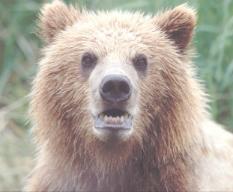I was fortunate to be able to attend the 18th International Association of Bear Research and Management (IBA) conference Nov 4-11 in Monterrey Mexico. The IBA is a non-profit organization open to professional biologists, wildlife managers and others dedicated to the conservation of all bear species. (www.bearbiology.com).
There were 268 people from 26 different countries at the conference making for a truly international experience. In all, 54 oral presentations were given along with 87 poster presentations. These ranged from bear research and conservation, bear nutrition, population estimates to human –bear interactions and conflicts. I attended all 54 talks, participated in a bear management workshop, attended two genetic workshops and the bear specialist group meeting. I also presented a poster on Bear Affair, a collaborative event with the Grizzly Bear Outreach Project and the Woodland Park Zoo.
All of the presentations were interesting but one that really impressed me was presented by Jon Swenson titled: “Pragmatic Management Can Conserve Low Productive High-Altitude Brown Bears in South Asia”. In 1993 the Deosai Plateau was declared a national park in order to try and protect the highly threatened brown bears in Pakistan whose numbers were declining. The local people rely on the natural resources in the park but legislation prohibited them from taking anything from the park which caused conflicts between the local people and park management. To help alleviate these conflicts a new approach was taken that involved the local people in park management and recognized their community rights. The number of bears in the park was monitored between 1993 and 2006 and in that time they saw an increase in the population of 5% each year (this was from reproduction and immigration). This is really impressive when you learn that the bears in Deosai have really low reproductive rates. The average age of first reproduction is 8.25 years, the reproduction interval is 5.8 years, litter size is 1.33 and the family stays together for 4.2 years (longest time recorded for brown bears). The survival rate of offspring is higher in Deosai as well (0.94 for cubs, 0.96 for yearlings). These results show that when communities and management work together they can make positive changes.
My poster was on Bear Affair, an annual event put on at the Woodland Park Zoo. The day starts off with a bear “un-safe” campsite being set up in the brown bear (Ursus arctos) exhibit. We put out a tent, sleeping bags, coolers, shoes, table and chairs, backpacks and a campfire pit. Food is placed either in or on all of these camping items. Dry food bags are hung up in a tree but are not put up high enough. All of this is done to show how not to set up a campsite in bear country. In the afternoon we give the bears bear resistant food containers (BRFC) and talk about why they are important to use when camping and /or hiking in bear country.
It was a very busy week filled with a lot of learning and sharing of
information with new and old friends. There were also the adventurous taxi and bus rides through the city, the likes I have not experienced before, but it made for many a laugh with the people I shared this experience with. What a wonderful way for a bear lover to spend a week!
“Pragmatic Management Can Conserve Low Productive High-Altitude Brown Bears In South Asia”. Muhammad Ali Nawaz (Department of Ecology and Natural Resource Management, Norwegian University of Life Sciences); Jon Swenson (Department of Ecology and Natural Resource Management, Norwegian University of Life Sciences); Vaqar Zakaria (Himalayan Wildlife Foundation, Islamabad, Pakistan).
Submitted by Wendy Gardner
skip to main |
skip to sidebar

"News about bears, and activities of the GBOP team as they promote an accurate understanding of grizzly bears and their recovery in the North Cascades Ecosystem through community education and involvement."
About Us

- The GBOP team
- The Grizzly Bear Outreach Project (GBOP) provides education and community outreach about Grizzly Bears in the North Cascade Ecosystem (NCE) of Washington State. This includes information about grizzly bear ecology and behavior, sanitation and safety in bear country, and policies associated with the recovery process. The project engages community members in a process of education and rational, multi-party dialogue that targets people living, recreating, and working in the NCE. It provides a non-advocacy setting for residents to make well-informed opinions on grizzly bear recovery, perceptions and attitudes towards bears based upon accurate information. Over the last two hundred years, the number of grizzly bears (Ursus arctos) has declined from an estimated 100,000 individuals in the lower 48 to around 1100. The grizzly bear was listed as a threatened species by the U.S. Fish and Wildlife Service in 1975 and six recovery ecosystems have been established since that time. The North Cascades Ecosystem (NCE) in North Central Washington is the largest grizzly bear recovery ecosystem. Less than 20 grizzly bears currently live in the NCE. photo credit: Chris Weston